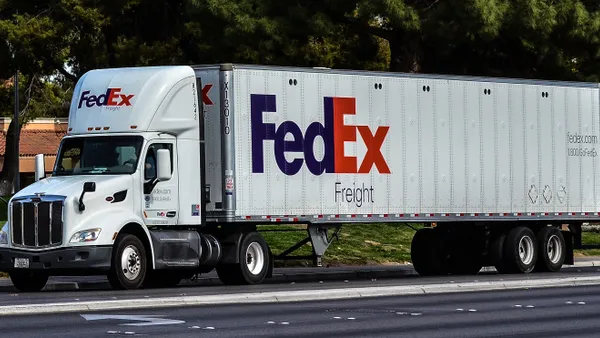Dive Brief:
- Convoy Go, the latest offering from the digital freight broker launched nationwide today, allows drop-and-hook shipments to be handled through the application. Such shipments allow carriers to pick up a loaded trailer from a shipper, as opposed to live shipments, when a carrier shows up with an empty container and waits for it to be loaded.
- The drop-and-hook shipments are "way, way more efficient in the sense that carriers need to spend less time in facilities and they have more flexibility to sequence their work and at the end of the day they end up being much more productive," Tito Hubert, product lead for Convoy Go, told Supply Chain Dive in an interview.
- Convoy will build a trailer pool for shippers interested in being part of the Convoy Go network. Convoy is currently leasing the trailers but could look into other ownership models in the future, Hubert said.
Dive Insight:
The addition of drop-and-hook shipments opens up the market — currently dominated by large asset-based carriers — to smaller carriers, according to Convoy.
The reason this space is currently dominated by larger carriers is the associated cost.
"In order to be drop-and-hook, you have to have at least two trailers: one on your truck and one someplace else," Michael Zimmerman, a partner at A.T. Kearney, told Supply Chain Dive in an interview. "Or you have to be able to drop the one trailer that you have and hope and expect the shipper is going to provide you the load in a timely manner. So the larger the trucking company you are … the more you can afford to buy extra trailers and drop them someplace."
With drop-and-hook, carriers are in and out of a facility in 30 minutes to 1 hour, while a live load could take up to three hours, according to Hubert.
"In the past I was able to do 3 to 4 loads a week per truck but now, with Convoy Go, I can consistently do 6 loads per week per truck," Eduardo Canales, from Canales Trucking, who was involved in a pilot of Convoy Go, said in a statement.
The drop-and-hook practice is especially prevalent in the manufacturing space where factories running continuously can have quickly changing production schedules.
"They can’t do live loads because of the unpredictable nature of their production output," Zimmerman said. "They risk making the carriers wait for live loads, so they’re going to ask the carriers to drop trailers and they’re going to load them up and call up the carriers who can come pick them up and get in and out of there quickly."

Convoy is relying on its own app to transport empty trailers from the leasing company to the shippers involved in the network. When a shipper joins, a certain number of spots in the yard will be reserved for Convoy Go containers.
The result of Convoy moving into this market will mean more competition, which, in the end, will be good for the customer, Zimmerman said.
"I would say this is further evidence of the trend where new disrupters are using software and probably AI and machine learning algorithms to find new opportunities and pursue them offering greater services to carriers and shippers and disrupting traditional brokers," he said.














